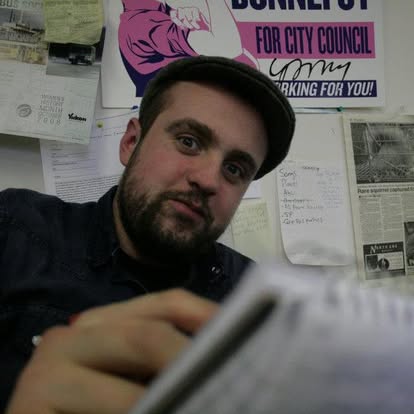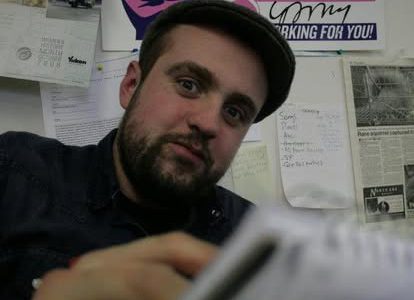The two interviews I have chosen for this post focus on themes of communication for development (and social change). I conducted both of them several years ago when I was a daily assignment news reporter. I have chosen to reflect on past interviews because in both cases, I think I learned something valuable that I have applied to my work. Those moments are really hard to replicate.
The names of the two people I interviewed have been changed to protect their privacy.
Mona – Whitehorse, Yukon
I met Mona while researching a radio story on women living on the street during the long Yukon winter. We have a term here called “shack up season,” which is the time of year that people tend to move in together for the winter. For vulnerable women and kids “shack up season” can be dangerous, and some choose to live in shelters or on the street, rather than in a potentially unsafe environment.
When I met Mona, she’d been on the street for a long time. It was early in the morning and she was sitting on a curb, cracking open the lid of a vodka bottle. She was an Indigenous woman in her mid 50s, small with sparkling eyes. It was probably -10 C and she’d been up all night in the cold
Among the questions I had for her were: “What does the territorial government need to do to improve the shelter for people who use it?” “What is the experience of women using the shelter or sleeping rough?” And “what more would you like to see done for people living on the street?”
We got along right away. She was generous with her time and she spoke frankly. Our rapport throughout the interview was good. I remember feeling like she really wanted to tell me everything she was saying.
Here’s what she told me: her experience in the shelter had been very bad. She’d been robbed. She’d been assaulted. She slept just as badly outside in her tent as she did in the shelter, but at least she and her partner were safer there and they could drink. The shelter required people to stay sober and she had no plans to do that.
Mona said she needed housing. Simple as that. She wanted a place to live where she and her partner could rest. Her partner’s kids could come visit. Then, eventually, she could think about cutting back on her drinking.
At that point I’d never heard of the “housing first” approach to treatment. For all the policy recommendations and government accountability I had envisioned when I met her, by the time I finished my interview, my view on her situation was much simpler. She needed a roof over her head. Then she could talk about fixing the other challenges in her life. That became the core of my story.
I think a lesson from that interview was to go right to the source. You have to get past the policy and the theory and talk directly to the people receiving aid or social support. They’ll tell you what they need.
Jordan – Baffin Correctional Centre
I didn’t really “meet” Jordan at all. He was an inmate at the Baffin Correctional Centre in Iqaluit, Nunavut. I was in Iqaluit too, working as a reporter on a temporary contract.
He would call the newsroom — and other newsrooms in the territory— and start talking to whoever would listen. One time I got the call.
There was little rapport at all between us. He was on a jail phone and didn’t have a lot of time. It was a difficult interview. He was an Inuktitut language speaker working with a limited knowledge of English. He meandered in and out of storylines and it wasn’t clear to me where he was going with any of it. It’s difficult to call something like that an “interview.” It’s more of a stream of consciousness from a person in distress. But those calls can be revealing as well.
In terms of questions, I remember I asked him if he had been talking to a lawyer, I asked him to describe the conditions he was in, and what he thought people needed to know about the situation in the jail.
He offered a grim picture of his life there. Pouring out of him were scattered images of the chaotic, dirty, frightening environment he’d found himself in, mixed with details of his case.
I did a brief news story about the jail. I think I’m one of many who worked on that file. Not long afterward, the local newspaper ran a story about the squalid conditions at Baffin Correctional. The article laid bare just how bad things had become, and today the jail has been renovated and renamed. That’s tangible social change and I believe journalists helped bring it to life.
I remember Jordan because it was one of many moments in my journalism career where I had just listened, totally unsure about what would come of the call. I didn’t bow to deadline pressure or write the guy off. I just heard him out.
Often that is as valuable as a formal interview.
Conclusion: Contrasting the interviews and how I’ll put the experience to work
These were two very different interviews.
For one, I’d sought out Mona myself, whereas Jordan had cold-called me out of the blue. The level of preparation I have for an interview generally has an outcome on the result, often for the better. Sometimes spontaneity makes for a great interview too, but in the case of my chat with Jordan, I felt unprepared to do justice to what he was telling me.
There’s also a significant difference between an in-person interview, like the one I had with Mona, and a phone interview, like my talk with Jordan. I think it is generally much more difficult to connect with a subject over the phone. It’s also difficult to read the non-verbal cues, which I believe are essential elements of communication.
I think my last observation on the differences between these two interviews comes down to trust. For whatever reason, I immediately built rapport with Mona. I knew she wanted to share her story with me. You can get so much from an interview when both parties trust one another.
In terms of similarities, I think it’s really important to note that in both cases, I entered the interview as a privileged outsider. I think that always informs the interview in some way when issues of colonialism, race, economics, and gender/sexuality lie between the subject and the interviewer.
I have done a lot of interviews. And I could tell you a lot of lessons I’ve learned through interviewing. But from these two in particular, I am reflecting on notions of difference and the context in which we meet our subjects; the way an interview can broaden our understanding of a person or an issue or narrow it down to a specific point of focus; I’m also reflecting on the importance of meeting people where they are, of speaking to the recipients of aid or the intended beneficiaries of public policy decisions; and about the absolute importance of deep listening in an interview.
And as I get into the thesis phase of this course, I’ll be sure to keep these lessons in mind.


Wow, this was powerful and really eye opening to the realities that people face! Especially in Canada where so many have this vision that because it’s a developed country that it has all things figured out. “She needed a roof over her head. Then she could talk about fixing the other challenges in her life” really puts into perspective how we think about the development process. Great job!